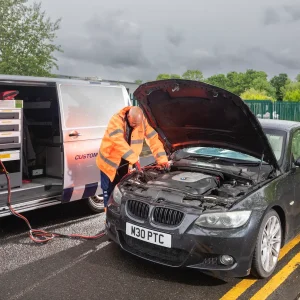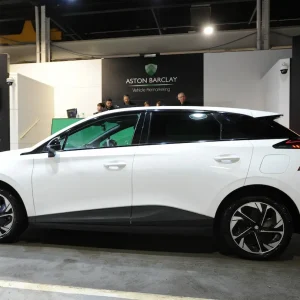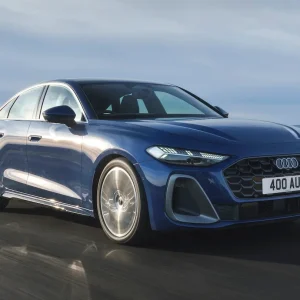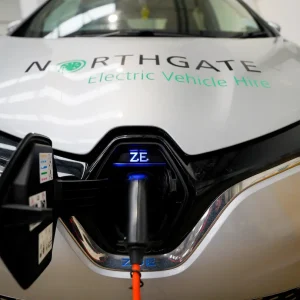“I’m absolutely delighted with 2013. As a fleet brand we’ve made enormous steps in every direction. Fleet sales were up and with a better sector mix.”
So says Hyundai’s fleet director Martin Wilson at the end of his first year heading up the business car operations of the UK’s number nine fleet brand.
Wilson took on the newly created director role on 1 January 2013, moving up from his previous position as national fleet sales manager and prior to that European fleet and remarketing manager based at Hyundai’s Frankfurt headquarters.
Over the past two years, there has been a big overhaul of how the company approaches the fleet market as it adjusts to being a top 10 fleet player.
“Our team and infrastructure has improved, with new personnel and areas we needed to look at,” Wilson explains to BusinessCar.
“On the marketing side we have improved dramatically, and customer care and aftersales, with the new customer charter, have improved dramatically, and we have a very robust and strong dealer centre programme. Plus, up-front prospecting and communication has improved.”
“We have improved every touch-point on how we talk to customers and prospects. The key for us is maybe 18 months ago we could be seen as a new fleet player, the new kid on the block, and we have exceeded expectations with product and personnel,” he continues. “Now we’re not the new kid on the block. We are more established, so customer expectations have risen again, and that’s the exciting bit.
“The infrastructure is getting to where we need to be in the fleet world.”
Whole-life costs
Wilson declares Hyundai’s key strength is the whole-life cost message, and is currently recruiting for a specific whole-life cost manager to work on further lowering running costs across the Hyundai range, and on the 23 new models coming over the next 40 months.
“Overall volumes for this year should be around 80,000, so we’ll go up again year-on-year,” he said. “In 2015/16 we really ramp up again and we will be not far off 100,000.”
The new Hyundai i10 was the first model in the new product offensive, and will be followed later this year by the Genesis executive saloon going in above the i40, although in low volumes, with the new i20 and ix35, revised i40 and then revised i30 all also in the pipeline over the next couple of years.
“Next year will be full-on. We’ve got to be talking to new clients now,” says Wilson. “Our product offensive is outstanding, and not only is it a nice range, it’s constantly being refreshed so we always have something to talk about.”
The new i10 has, according to Wilson, class-leading residual values, and the i40’s popularity since its mid-2011 launch has seen Hyundai’s demonstrator models still as in-demand now as they were at launch. “The [upper medium] D-segment is a sign of the state of the brand and we’re seeing no let-up in interest in the i40,” says Wilson.
Hyundai’s fleet supremo claims to have witnessed a change in leasing company attitudes towards the brand.
“Last year was the first time it really smacked me in the face. We were talking to leasing companies that are actively promoting strong lease rates – they are trying to be really competitive on our product and can see it as something that will grow within their portfolio,” he declares. “We have less than 1.5% share of the contract hire market [compared with 3.6% of the overall market] and we don’t need to move the needle far to have a big impact.
“If we doubled our market share on contract hire it would mean 10,000-15,000 registrations,” he continues. “Of course, that is not going to happen overnight, but this is where we will get consistent growth.” Wilson described the top five leasing companies as “having a real appetite to deal with us”, and said true fleet sales is Hyundai’s biggest growth area.
Targets
As well as contract hire volume, Motability and particularly public sector fleet sales are also targets to help build Hyundai’s further growth, specifically with the i20 supermini, a car Wilson says isn’t performing as well as the firm would like. “If the residual value and SMR is right with leasing companies then it’s a real incentive for public sector discussions. If we get both right it’s a really strong proposition,” he comments.
The company also began the roll-out of its 27 Fleet Business Centres at dealers across the country last September. The centres are designed to tailor the buying experience for SME business operators, including specific purchase deals and contract hire rates for fleets of up to 10 vehicles.
“As a business, we now have all the processes in place: fleet, Hyundai Motor UK and dealerships are geared up to understand the fleet driver and buyer,” says Wilson.
Strengths
The brand’s strengths don’t only lie in the practical and financial.
“Our cars are good looking and have everything in for a business driver. As much as it’s a case of value for money and whole-life cost, it’s about styling and some customers looking to have a change,” says Hyundai’s fleet director. “They have dealt with a major manufacturer for years and years and want an alternative. I’m not for one moment saying it will be easy – we’ve got the right infrastructure – yet we still need to convince businesses we are the way forward. There are still people entrenched in their brands,” Wilson says. “There are still people that don’t understand our product, and if people don’t know about it, then it’s up to me to make sure I get my team in front of as many people as possible.
“The team has grown over the past 12-24 months, and we’ve got a team of really passionate people. Every form of sales needs people to be passionate about what they do, and every touch-point with Hyundai needs to be a good one.”
An alternative fuel future
Looking to the future, Hyundai is working hard on establishing itself as a leader in hydrogen fuel-cell technology, and the ix35 Fuel Cell model will be out on the road by late spring.
Fleet boss Martin Wilson predicts the brand will lease 20-30 vehicles this year, with the first orders already placed, and the company’s own demonstration model due to arrive in April.
“We’ve got orders, but three areas have to be right: the second owner market, which is not quite there for now because it’s a new technology; the infrastructure needs to be in place; and there needs to be greater awareness,” he says. “The key for me is that it tells customers that we are at the forefront of technology, but I’m under no illusion that every one of our customers will put their hands up for one.”
The early adopters include public sector organisations under pressure to make moves to improve local air pollution, and those with a vested interest in the hydrogen market becoming more established, such as refuelling operators.
“The City of London are really passionate because it drives down emissions,” says Wilson. “To have a car like the ix35 that can be refuelled in three to four minutes and not have range or air pollution issues is exciting stuff.”
Brand recognition
Hyundai is hoping to raise its profile to new levels through a pair of sporting associations during 2014, with a return to motorsport in the World Rally Championship complemented by sponsorship of the 2014 football World Cup in Brazil this summer.
Although it was something of an ignominious start to the rally season, with both i20 WRC cars retiring on day one, Hyundai has committed to a learning season before a serious assault on the championship in 2015.
The World Cup sponsorship will put the company’s logo in front of most households in the UK.
“You can’t put a television on three months before the World Cup without seeing sponsorship. It’s all good for product recognition,” says Hyundai fleet chief Martin Wilson. “With WRC and the World Cup we will be front of mind.”
See how they’ve grown
Hyundai has enjoyed strong growth over the past few years, having traditionally languished just outside the lower reaches of the top 20 fleet manufacturers by registration volume. That all changed in 2010 with a massive jump in sales, and the past two years have seen the Korean brand consolidate its place within the top 10, ahead of more traditionally popular brands such as Toyota, Citroen and Renault. Last year saw the company enjoy modest growth as it retained ninth position in the table, breaking through the 40,000-registration mark for the first time. In 2009, it only just breached 7000.
| Hyundai’s fleet sales growth | |||
| Year | Fleet registrations | % change | Fleet position |
| 2013 | 40,884 | +2.3 | 9 |
| 2012 | 39,960 | +28.4 | 9 |
| 2011 | 28,593 | +53.6 | 12 |
| 2010 | 18,610 | +157.4 | 14 |
| 2009 | 7230 | -19.0 | 23 |
| Source: SMMT | |||





